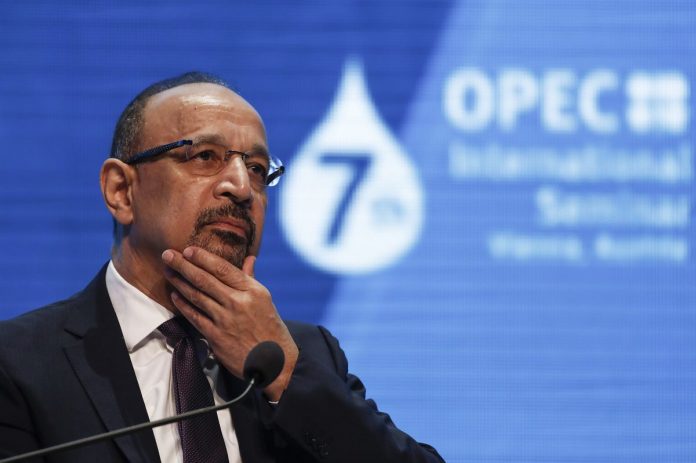
(Bloomberg) — Saudi Arabia will coordinate with other crude producers to ensure that adequate supplies are available and the market “does not go out of balance,” Energy Minister Khalid Al-Falih said, after the U.S. ended waivers for buyers of Iranian oil.
The Saudis are closely monitoring oil-market developments after the U.S. announcement regarding export sanctions on Iran, Al-Falih said in a statement. “In the next few weeks, the Kingdom will be consulting closely with other producing countries and key oil consuming nations to ensure a well-balanced and stable oil market, for the benefits of producers and consumers as well as the stability of the world economy.”
Saudi Arabia and the United Arab Emirates will ensure an “appropriate supply” of oil along with the U.S., as President Donald Trump won’t re-issue Iran oil waivers set to expire in May, Secretary of State Mike Pompeo told reporters earlier on Monday in Washington. “Saudi Arabia and others in OPEC will more than make up the Oil Flow difference in our now Full Sanctions on Iranian Oil,” Trump said on Twitter.
The current set of waivers — issued to China, Greece, India, Italy, Japan, South Korea, Taiwan and Turkey — are to expire on May 2. The Saudis and the U.A.E. can increase their combined production by about 1.5 million barrels a day within a short period, according to people with knowledge of the matter, asking not to be identified because the matter is confidential.
Iran shipped about 1.1 million barrels a day of crude and condensate in the first two weeks of April, tanker-tracking data compiled by Bloomberg show.
Saudi Arabia will assess the impact of the U.S. decision on the oil market before raising output, according to one of the people. The biggest producer in the Organization of Petroleum Exporting Countries can pump an additional 1 million barrels a day within a short period, the person said. Saudi Arabia produced 9.82 million barrels a day in March, according to data compiled by Bloomberg.
The U.A.E. can increase output to 3.5 million barrels a day from a current level of 3.045 million, one of the people said.
OPEC and allied suppliers including Russia agreed to limit their production until the end of June to buttress crude prices and avert a glut. They are due to meet next month to assess the market and again in June to decide whether to extend the cuts.
Russia’s Economy Ministry sees its crude and condensate output increasing slightly in 2019 to 558 million tons, or 11.21 million barrels a day, according to its five-year outlook. Russia produced 556 million tons in 2018.





